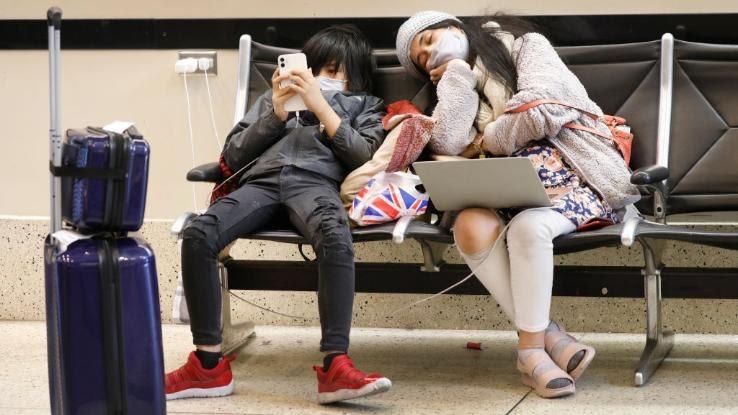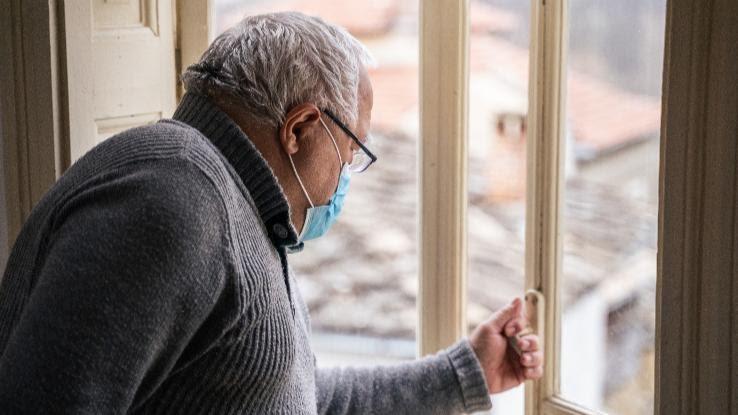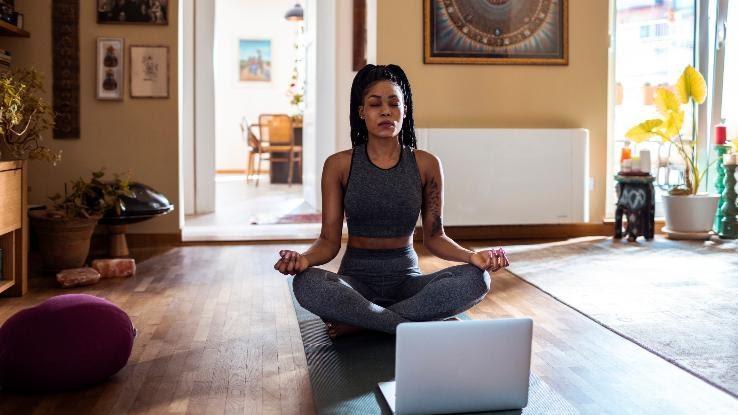How Do I Get My Fight and Desire Back

2020 is a year that will forever be remembered for a number of things, but the novel coronavirus pandemic is far and away the most notable, year-spanning event we endured. In the United States alone, the virus infected millions of people and resulted in hundreds of thousands of deaths.
Despite the fact that global health officials outlined clear guidelines to follow to slow the spread of the virus, the United States continued to see increasing infection numbers and broke records in daily case counts. But what was behind this difficulty in preventing COVID-19 transmission — or in exhibiting a willingness, in making a concerted effort, to try and slow it?
In November of 2020, U.S. Surgeon General Jerome Adams told NPR's All Things Considered that what medical professionals started calling "pandemic fatigue" had become a determining factor in the various surges of cases, and this emerging condition may be what's behind the uptick in people's surfacing disinclination to take mitigation measures seriously. But what exactly is pandemic fatigue, and what can you do to fight it? Learning more about this pandemic-induced syndrome, along with some helpful tips you can use to limit it, can empower you to protect your physical and mental health during this difficult time.
The Dealing-With-COVID Struggle Is Real
Depending on where you're located in the United States, you may have already endured multiple lockdowns throughout 2020 and 2021 as a preventative measure to limit the effects of the COVID-19 crisis. Some folks, whether they live in areas where the virus has hit the hardest or not, have more or less been in a state of continuous quarantine since March. And this drawn-out back and forth — not to mention the relative isolation it's required — can take a big toll on how you're feeling each day.

According to the Centers for Disease Control and Prevention (CDC), the current pandemic-induced combination of stress, social distancing and economic insecurity is adding up to create some very real mental health challenges — challenges that contribute to pandemic fatigue. The Washington Post recently revealed that "one in eight Americans reported they sometimes or often didn't have enough food to eat in the past week" as a result of employment or other lifestyle changes brought on by the pandemic.
Catherine Rampell, a Washington Post columnist, also reported that, as of December 4, 2020, "the U.S. economy still has a greater jobs deficit than was the case at the very worst point of every previous post-war recession, including the Great Recession." Furthermore, an article by ScienceNews columnist Sujata Gupta explains that experts are warning "prolonged isolation during the pandemic may worsen or trigger mental health problems" and result in serious "psychological fallout" that could accelerate the longer the pandemic lasts.
As a nation, we're feeling exhausted and scared, and we're reaching new levels of stress with each passing day due to the lack of agency we have over our life circumstances. If you're one of the many people feeling these effects, you're not alone — and there's something you can do about it.
According to the CDC and UCLA Health, pandemic fatigue can manifest in a variety of ways. Common symptoms of this ailment — the "very real feeling of exhaustion stemming from the effects of the novel coronavirus on your life" — include:

- Emotions such as fear, anxiety, loneliness and/or hopelessness
- Eating and/or sleeping more or less than usual
- Difficulty concentrating (brain fog)
- Edginess, irritability and/or the tendency to snap at others
- Decrease in motivation
- Racing thoughts
- The tendency to withdraw and isolate
- The worsening of chronic health or mental health conditions
- Increased use of alcohol, drugs or tobacco
The CDC further notes that a person's background, financial status, social support network, community and overall health can all impact the ways they respond to the stress of the pandemic. Some of us might navigate the situation differently than others simply because our lives are different — but that doesn't negate the very real feelings it's stirring up. The pandemic is a long-term event that's affected people around the world on a level beyond that of any other event in recent history. And that's precisely why it's so essential to learn about this type of fatigue and how to best take care of yourself in return.
Is There an End in Sight?
Now that COVID-19 vaccines are being administered across the country, it's become a bit easier to take some measure of comfort in knowing that an end is in sight. That said, it's essential to keep in mind that preventative measures such as physical distancing, hand hygiene and mask-wearing remain just as important as ever. We can't let these practices go just yet, even if they're contributing to our distress.

Unfortunately, 2020's winter season and various other holidays ushered in an increased incidence of infection. While health officials recommend avoiding gatherings, it's incredibly important to take every available precaution if you do plan to meet up with friends or family members.
This can be especially true for people in areas where anti-mask sentiments are high or where they may face social backlash for making the responsible choice to wear a mask and practice physical distancing. If you've been tempted to doff your mask in public because you've grown increasingly weary of following recommendations — this type of burnout is another very real effect of the pandemic — remember that wearing a mask isn't just for your benefit. It's something that people are doing in order to protect others who they might accidentally infect with the virus, too.
Studies show that 40-50% of people who test positive for the virus are asymptomatic. But the fact that you don't feel sick doesn't mean that you aren't positive for COVID-19, and it's also no guarantee that you won't infect someone else whose body may respond very differently and become very ill. There will come a time when we're able to shop in public maskless and hug our loved ones without quarantining first, and we're on the road to those days thanks to the vaccine. But until herd immunity is achieved and health officials have deemed it safe to relax restrictions, it's essential to keep taking responsible precautions to safeguard yourself and others — and to protect your mental health.
Yes, You Can Fight Pandemic Fatigue
Until the vaccine has been deployed on a larger scale and it becomes available to everyone, restrictions are likely to continue — and pandemic fatigue will remain a very real challenge. Luckily, there are things you can do to help combat its effects. Experts suggest that you:

- Take care of your body: A little exercise can go a long way towards helping fight depression or anxiety. Channel your energy into something healthy by designing your own exercise routine or taking advantage of one of the many online fitness classes available. Take some downtime, if you have it, to learn to cook healthy new dishes for yourself and your family.
- Limit your news intake: Between the pandemic, other lingering effects of 2020 and 2021's continuing deluge of overwhelming headlines, the news can sometimes feel like a nervous breakdown waiting to happen. Stay informed, but don't let yourself fall into the rabbithole of constant vigilance. Take steps to avoid doomscrolling.
- Connect with others: It's incredibly important to connect with others over the phone or via Zoom during this time. Social media can also be an outlet, but try to avoid getting sucked into it for hours at a time. Set healthy boundaries when it comes to the people you connect with. If you have a friend whose posts are a constant flow of negativity, now's a good time to hit the "unfollow" button. You might opt to link up with them on a more personal level if you want to maintain contact.
- Lower your stress: It's equally important to have a healthy mental outlet for stress to avoid falling into destructive or addictive behaviors. Try taking up yoga, guided meditations or even coloring to give your mind and body space to relax and focus on something calming that helps you unwind.
- Accept your feelings: Hiding your emotions may be a coping tool that you've long used, but it's not the healthiest choice. Instead, try to redirect them by making it a habit to acknowledge them and engage in positive self-talk when the emotions arise. Another helpful exercise is to get a notebook and write a page about whatever is on your mind at the time. Write as fast as you can and pay no attention to grammar or spelling. The point isn't to make sense — it's to get those negative emotions out of your head and onto the page, releasing them so you can refocus.
While you can work to beat pandemic fatigue with these helpful tips, sometimes it's important to ask for help. The CDC offers a variety of mental health resources and support options you can safely utilize if you or someone you love is having difficulty coping. One day, we'll look back at this experience and marvel at how we worked through it — and working through it starts with being kind to yourself while taking practical steps towards healing.
MORE FROM ASK.COM
How Do I Get My Fight and Desire Back
Source: https://www.ask.com/culture/pandemic-fatigue?utm_content=params%3Ao%3D740004%26ad%3DdirN%26qo%3DserpIndex
0 Response to "How Do I Get My Fight and Desire Back"
Postar um comentário